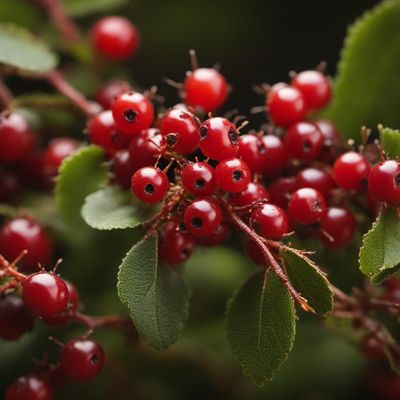
Ingredient
Crowberries
The Dark and Tangy Gems of the Arctic
Crowberries are small, round berries that range in color from dark purple to black. They have a slightly tart taste with a hint of sweetness and a juicy texture. The berries are often used to make jams, jellies, and sauces, as well as in baked goods and desserts. Their deep color and intense flavor add a vibrant touch to any dish.
Origins and history
Crowberries are native to the Arctic regions, including parts of North America, Europe, and Asia. They have been traditionally harvested by indigenous communities for centuries and are an important food source in these regions. Crowberries are known for their ability to withstand extreme weather conditions and are often found growing in rocky or sandy areas. They have cultural significance and are used in various traditional dishes and remedies.
Nutritional information
Crowberries are low in calories and rich in antioxidants, vitamins, and minerals. They are particularly high in vitamin C and contain beneficial compounds that may help support immune health and reduce inflammation. Additionally, they are a good source of dietary fiber.
Allergens
Crowberries are not known to be allergenic and are generally safe for consumption. However, individuals with known allergies to berries or other fruits should exercise caution and consult with a healthcare professional if necessary.
How to select
When selecting crowberries, look for plump and firm berries that are free from mold or signs of decay. Avoid berries that appear shriveled or overly soft, as these may indicate poor quality or spoilage. Fresh crowberries can be found in some specialty stores or farmers markets, while frozen or dried options may be more readily available.
Storage recommendations
To maintain the freshness and quality of crowberries, store them in the refrigerator in a breathable container or a perforated plastic bag. This will help prevent moisture buildup and extend their shelf life. Fresh crowberries can be stored for up to a week, while frozen or dried berries can be kept for several months.
How to produce
Crowberries can be found growing in the wild in Arctic regions, but they can also be cultivated in home gardens or pots. They require well-drained soil and prefer cool temperatures. Crowberry plants are low-growing and spread through rhizomes. They can be propagated through seeds or by dividing established plants.
Preparation tips
Crowberries can be used in a variety of ways in the kitchen. They can be enjoyed fresh as a snack, added to salads for a burst of tanginess, or used to make jams, jellies, and sauces. They can also be incorporated into baked goods, such as pies, muffins, or tarts, for a unique twist. Additionally, crowberries can be used to infuse beverages, such as cocktails or flavored water.
Culinary uses
Crowberries are commonly used in Scandinavian and Arctic cuisines. They are often featured in traditional dishes, such as jams, preserves, and desserts. Crowberry sauce is a popular accompaniment to game meats, adding a tangy and slightly sweet flavor. These berries are also used in herbal teas and liqueurs, showcasing their versatility in both sweet and savory applications.
Availability
Crowberries are primarily found in Arctic regions, including parts of North America (such as Alaska and Canada), Europe (such as Iceland and Scandinavia), and Asia (such as Russia and Siberia). They are typically harvested in the late summer or early fall when they are fully ripe.
More ingredients from this category
Recipes using Crowberries » Browse all

Inuit-inspired Arctic Rice Balls
Savory Arctic Delights: Inuit-inspired Rice Balls with a Twist

Scottish Oatmeal Porridge with Whisky-Infused Berries
Whisky-Infused Scottish Oatmeal Porridge: A Hearty Breakfast Delight

Argentinian Pavlova
Dulce de Leche Pavlova: A Sweet and Creamy Argentinian Delight

Tuscan-inspired Caramel Pudding
Dolce Vita Caramel Delight

Toronto-style Crispy French Toast
Maple-infused Crispy French Toast with a Toronto Twist

Molecular Meringue Delight
Whimsical Meringue Clouds: A Molecular Gastronomy Twist

Basque-style Kaiserschmarrn
Puffy Basque Delight: A Twist on Kaiserschmarrn

British Berry Delight Parfait
Berrylicious Summer Parfait: A British Twist on a French Classic

Rocky Mountain Berry Delight
Mountain Berry Bliss: A Sweet Pie with a Rocky Twist

Oaxacan Chocolate Torte
Mole-infused Chocolate Delight

Langley Wakes Cakes
Delightful Morning Treat: Langley Wakes Cakes

Chukchi-style Stuffed Dumplings
Arctic Delights: Chukchi-inspired Stuffed Dumplings


